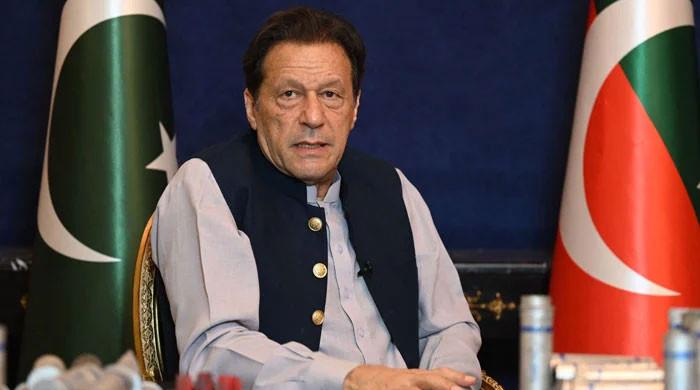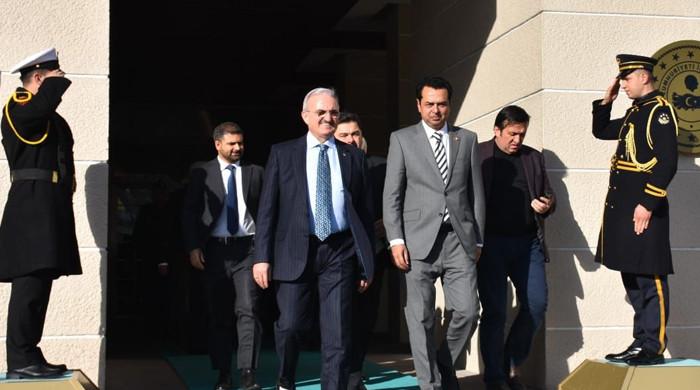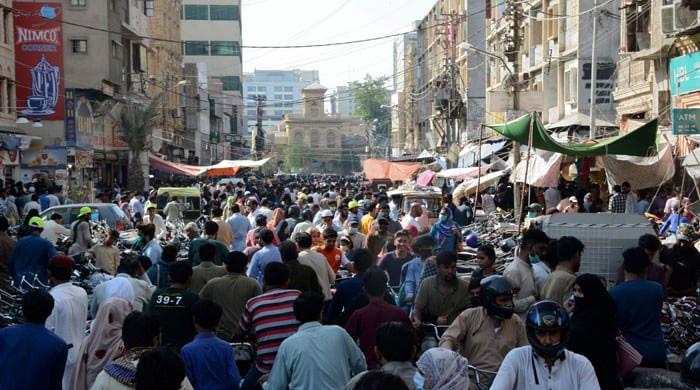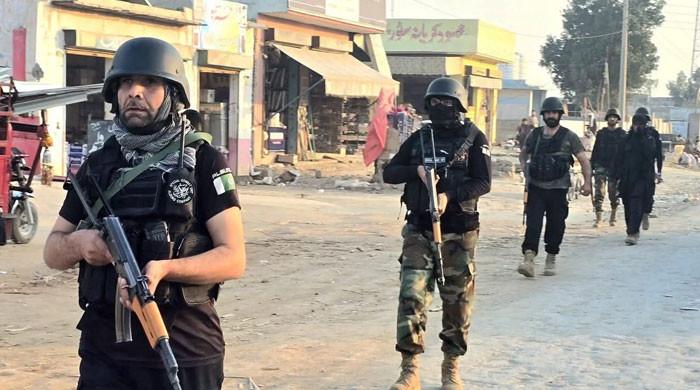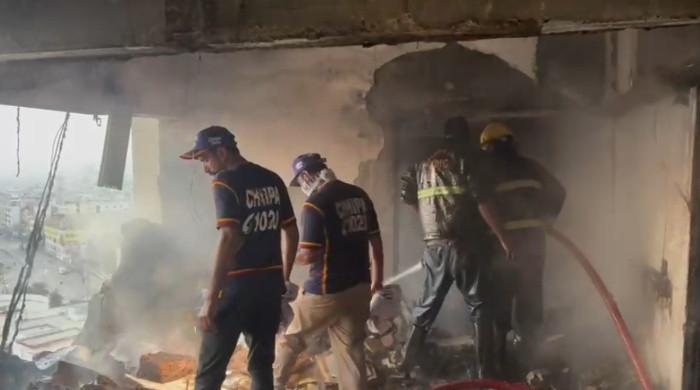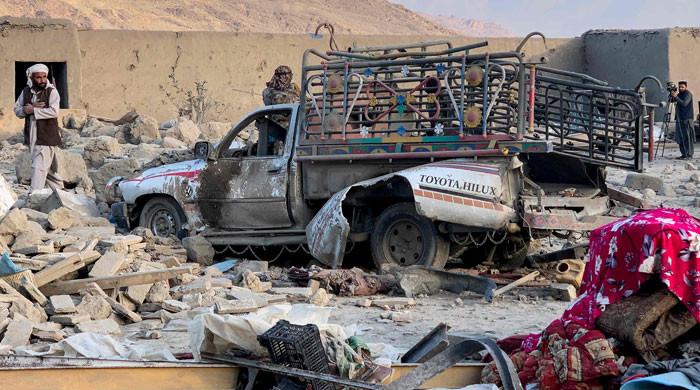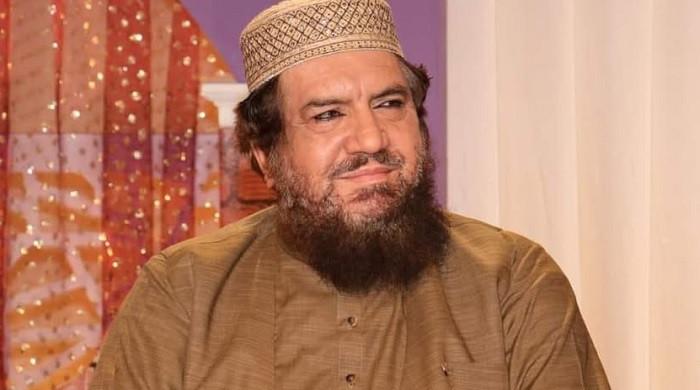President Trump-Field Marshal Munir meeting: Who made it happen?
Several individuals worked behind scenes to organise this meeting, boosting ties between two important countries
June 20, 2025
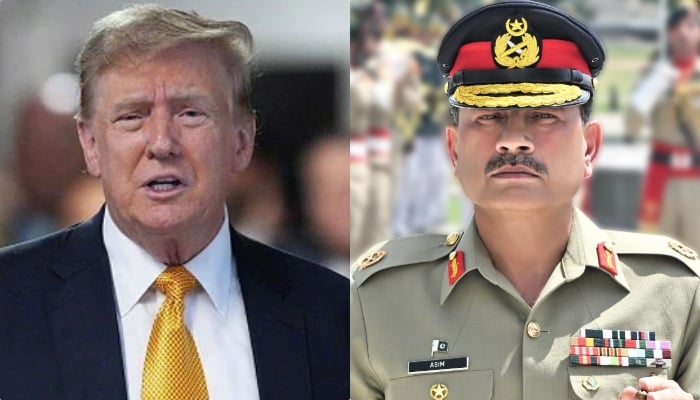
LONDON: US President Donald Trump’s luncheon meeting with Chief of Army Staff (COAS) Field Marshal Syed Asim Munir at the White House, followed by a visit to the Oval Office, had a seismic impact both inside and outside Pakistan — owing to its timing, significance, and intensity.
The two-hour-long meeting, originally scheduled for one hour, between COAS Munir and Trump and his whole cabinet is regarded as unique, historic, and uncommon, The News reported on Friday.
Several individuals worked behind the scenes to organise this meeting, boosting relations between the two important countries — with a huge impact on the region, global significance and Pakistan’s internal politics with regard to the Pakistan Tehreek-e-Insaaf (PTI) at home and abroad. This correspondent spoke to three credible sources who are familiar with the background developments.
The work on the meeting started nearly three weeks ago when a senior intelligence major general rank officer arrived in Washington and held meetings with senior and important officials in the Trump administration, a source confirmed.
The grounds for meetings were set with the major general’s meetings but the actual meeting would not have been possible without the decisive intervention of President Trump’s US Middle East Envoy and his staunch ally Steve Witkoff, who was present during the field marshal’s meeting with President Trump as well. Others in the exclusive meeting were Secretary of State Senator Marco Rubio and Pakistan’s National Security Adviser General Asim Malik.
Knowledgeable sources said that Witkoff was requested for the meeting by a credible Middle Eastern-based Pakistani businessman who has closer ties to Witkoff as well as with Middle Eastern royal families. There were several back-and-forth calls and presentations before the meeting between the two powerful figures was finalised, said the source who had shared in advance with this reporter that the meeting would happen. This was at least 36 hours before the meeting was announced on Wednesday.
The Pakistani army intelligence officer took several trips to Washington DC where he met the US officials and members of Pakistani diaspora considered close to the Trump administration. The purpose of these meetings was not just the field marshal’s visit but also to deal with the campaigns run by supporters of former prime minister Imran Khan with the help of a group of US senators.
COAS Munir was in the UAE before travelling to the US on the invitation of the Centcom. According to the previous schedule, he was to attend meetings with the Centcom and Pentagon officials but the whole programme was rescheduled just a few hours before Field Marshal Munir landed in Washington and met President Trump on the third day of his visit in an unprecedented display of backdoor diplomacy.
The US-Pakistan closeness didn’t happen overnight. The relations were full of awkward anticipation and the fear of the unknown only a few months before Trump was elected with a thumping win. There were fears that he would call for the release of Imran and may go the extra mile intervening in Pakistan affairs but the opposite happened — to the pleasure of the powers that be in Pakistan.
On January 15, 2025, this correspondent reported exclusively that a Texas hedge fund manager and a business partner of the Trump family had praised Pakistan’s sacrifices in the war against terrorism, advising President-elect Trump to make Pakistan-American relations stronger than before.
Two weeks later, he was in Islamabad meeting Pakistani leaders including Prime Minister Shehbaz Sharif and said that President Trump’s aide Richard Grenell “may have been misled” over his support for the release of PTI founding chairman Imran’s campaign by a lobby working in the United States.
This was followed by close meetings between the officials and informal lobbyists of the two countries, bringing them closer over the crypto currency as well as the rare minerals in Pakistan and the wider trade cooperation.
The next clear sign of growing ties came when India attacked Pakistan and President Trump clearly stayed neutral and called on both countries to step back, winning praise from millions of Pakistanis and getting attacked by PM Modi’s govt and his support base.
The source said that COAS Munir and Trump’s teams discussed forging a strategic alliance around minerals, crypto partnership, oil and gas exploration, mining opportunities, data centres, bitcoin mining, real estate development and export improvements for Pakistan.
He said: “Pakistan has revamped its foreign policy. It’s a new era for Pakistan. This is new economic diplomacy. The relations are geared towards economic cooperation with each other.”
The meeting is seen as an unprecedented development as no previous chief of army staff in Pakistan’s history has ever held a meeting of this magnitude with a sitting US president at the White House. This historic engagement marks a defining moment in the history of Pakistan-US relations and reflects a new level of recognition of Pakistan’s military leadership on the global stage.
Previously, General (retd) Pervez Musharraf met US presidents during his tenure but as President of Pakistan, not as the army chief; General (retd) Raheel Sharif (2015) and General Qamar Javed Bajwa (2022) visited Washington for defence-focused engagements but did not meet with the US president at the White House, nor in the presence of the full cabinet, and certainly not in a solo diplomatic capacity.
Field Marshal Munir is the first military leader in Pakistan’s history to meet the US president in this capacity. No civilian government delegation accompanied him, making this a uniquely solo military-level engagement. The engagement included a formal lunch with President Trump and meetings with members of the US Cabinet, reflecting the seriousness of the dialogue and the depth of bilateral strategic alignment. While previous Pakistan army chiefs have visited Washington for military-to-military engagements, none have ever held such a high-level political meeting at the White House, particularly without a parallel civilian government presence.
At the Cabinet Room meeting, Trump showered praise on COAS Munir and called him a visionary leader and a friend, said the source. Trump also thanked Field Marshal Munir for helping the US and allies in counterterrorism.
After the meeting, the US president said he was honoured to meet COAS Munir and that they had discussed Iran, which he said Pakistan knew better than most. Trump told reporters he had thanked the Pakistani military leader for ending the war with India, for which he also praised Indian Prime Minister Narendra Modi.
“Two very smart people decided not to keep going with that war; that could have been a nuclear war,” Trump told reporters.
Originally published in The News




